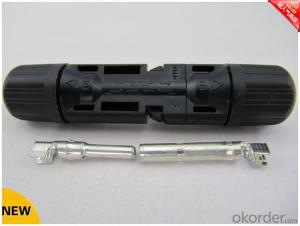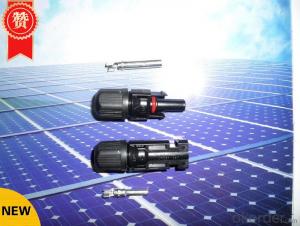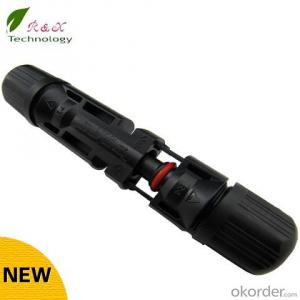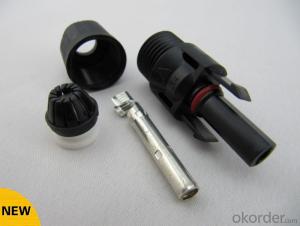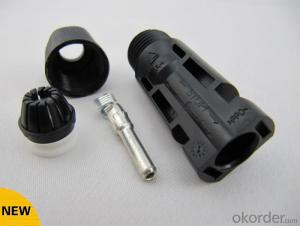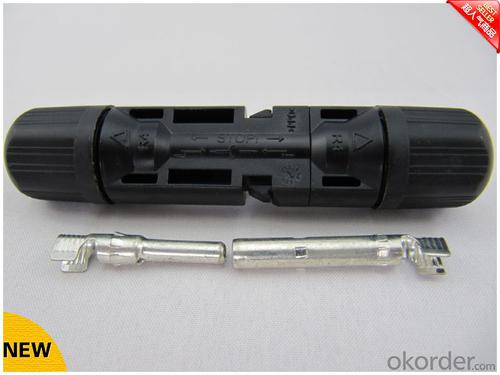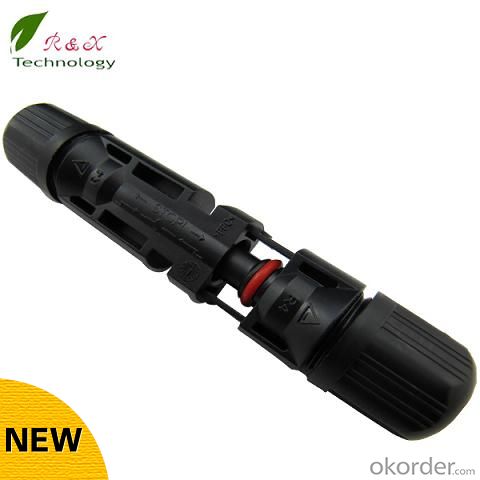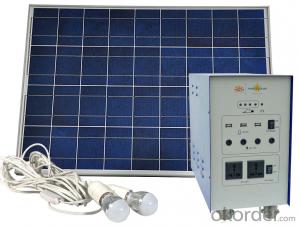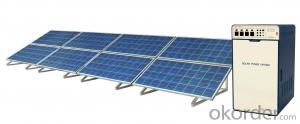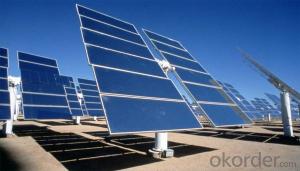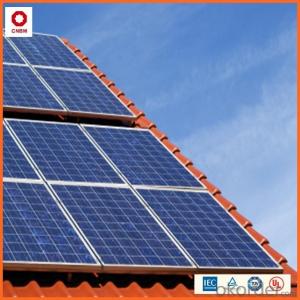Solar Energy Systems in Texas - MC4 Female/Male Can Contact 2.5/4/6mm2 Cable
- Loading Port:
- Guangzhou
- Payment Terms:
- TT OR LC
- Min Order Qty:
- 100 set
- Supply Capability:
- 100000 set/month
OKorder Service Pledge
OKorder Financial Service
You Might Also Like

Brief introductions of product:
Connector R4 System for photovoltaic adopts contact and insertion of reed with inner-knob type.It is used with male and famale points.pv junction box and cables made of elastomeric material and makes contact and isertion more certified by IEC61215 and TUV 2PFG1161.
Mainly parameters of product:
Rated voltage 1000V DC
Rated current 30A
Test volaage 6KV(50HZ,1min.)
Ambient temperaure range -40°C...+90°C
Upper limiting temperature 105°C
Degree of protection,mated IP67
unmated IP2X
Contact resistance of plug connectors 0.5m?
Safety class II
Contact system R4 Multilam
Type of termination Crimping
Contact material
Copper,tin plated
Locking system Snap-in(R4)
Cable type PV-F 1169 1*4mm2
1*6mm2
Design paper of product:
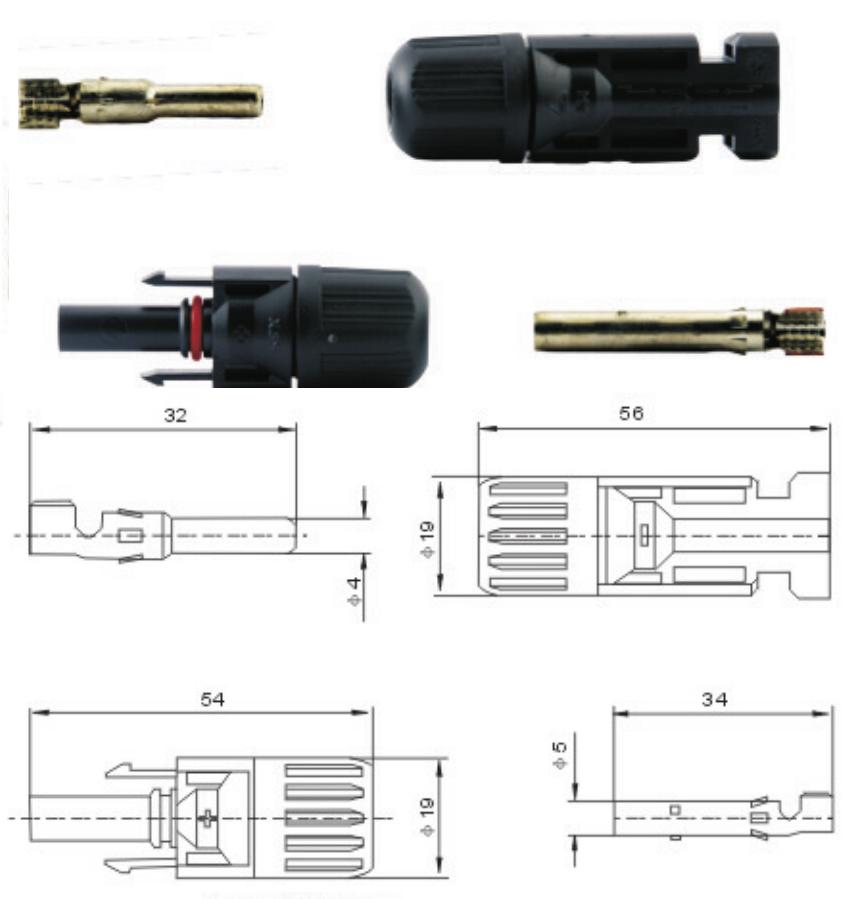
Way of product installation:
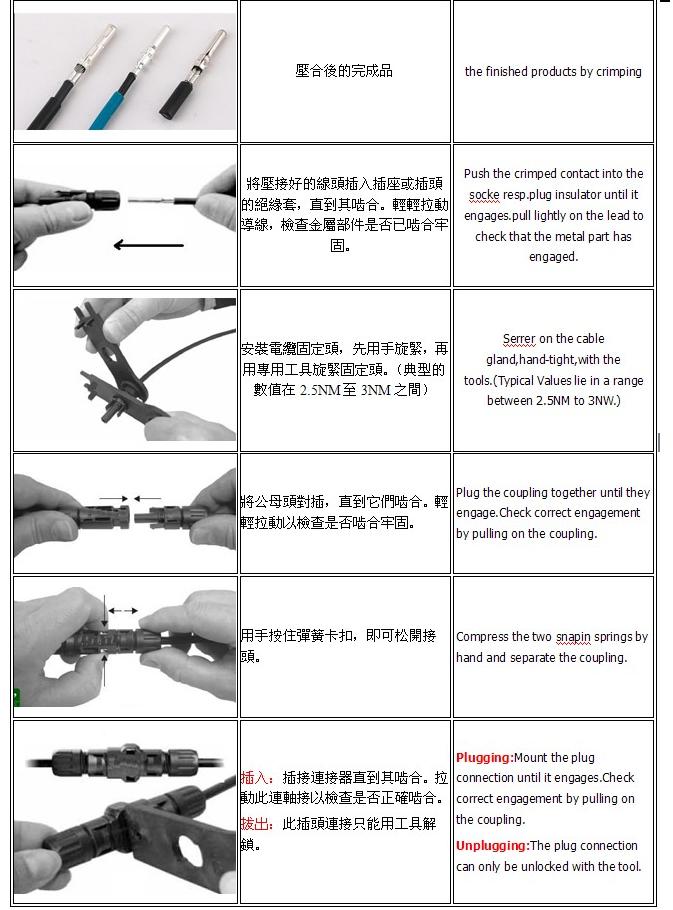
Quality inspection process:
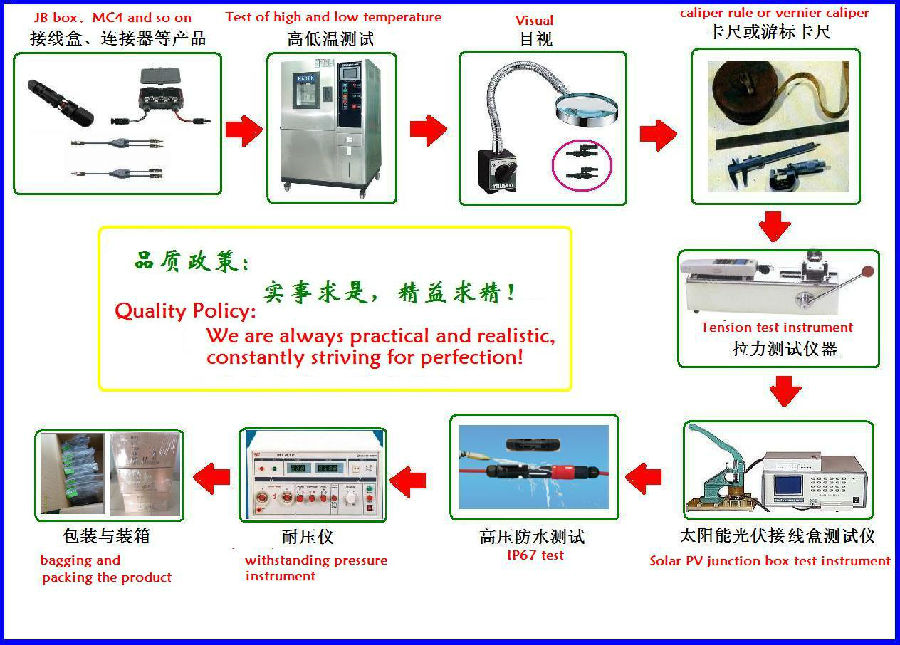
Application pictures of product:
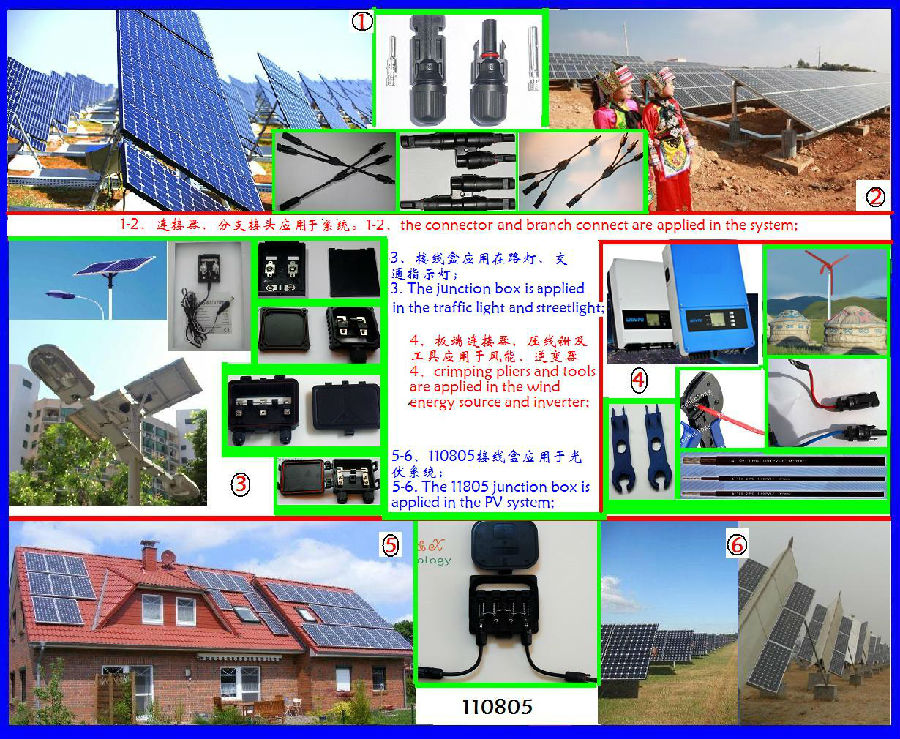
Machine equipment and production workshop:
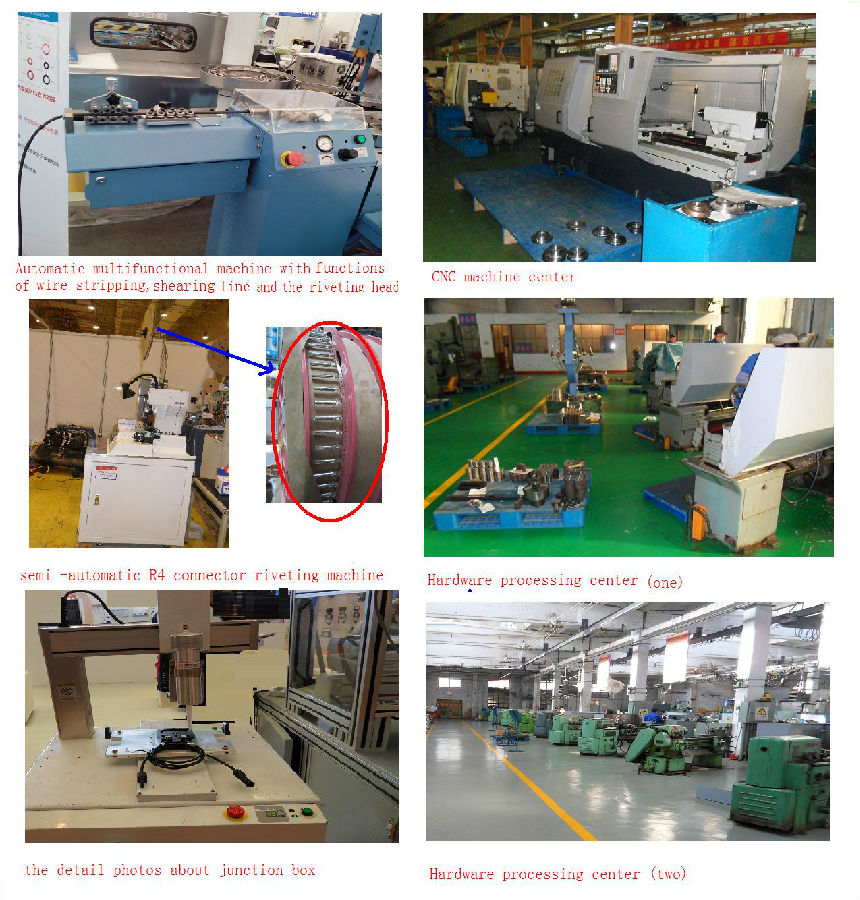
Pictures of discussing in the exhibition:
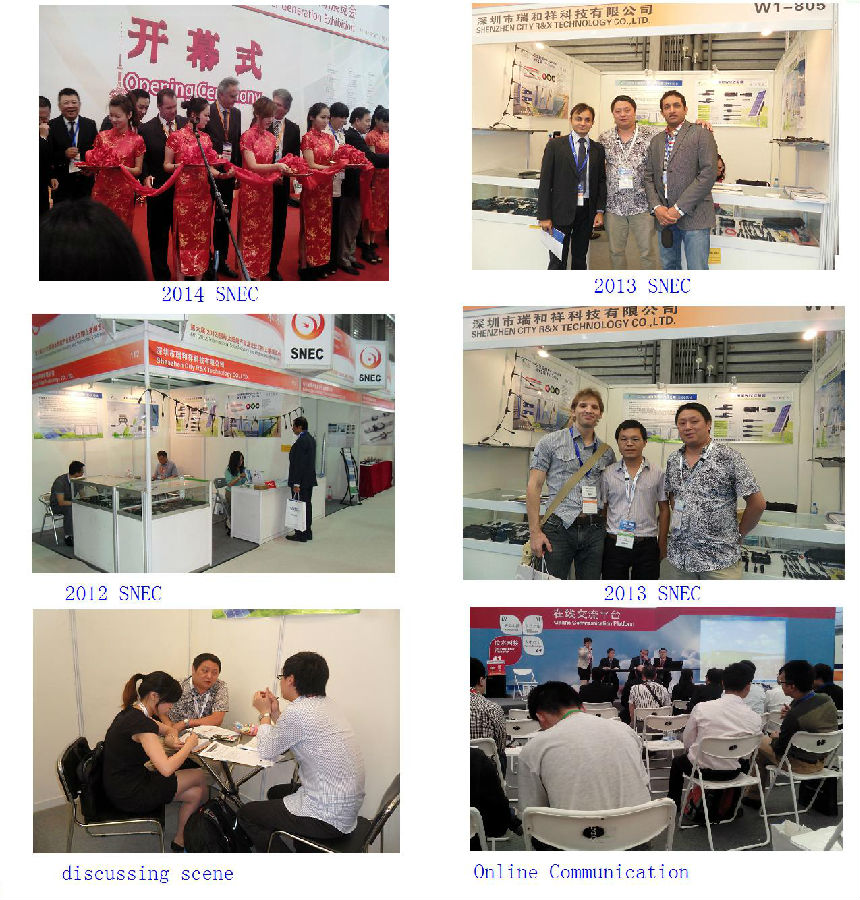
True application picture of the project:

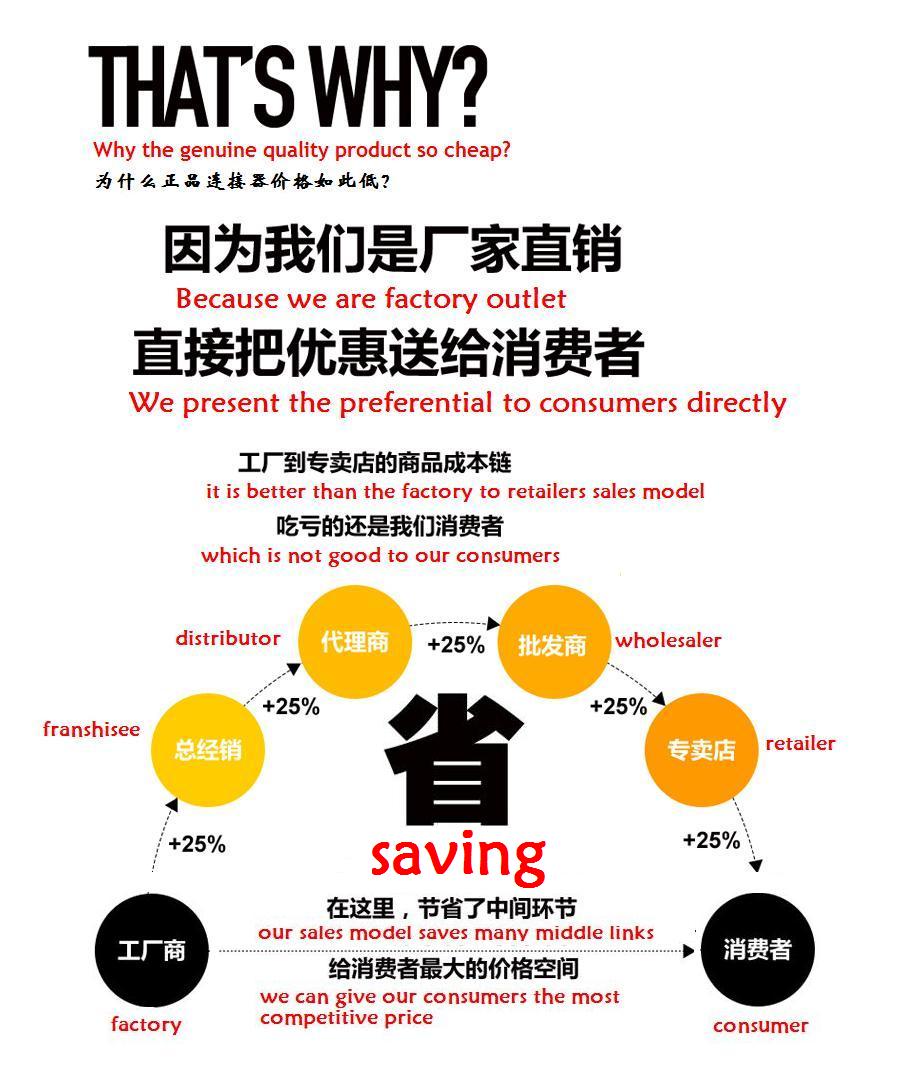
Multi-Contact Multi-Contact Multi-Contact Multi-Contact Multi-Contact Multi-Contact
- Q: Can solar energy systems be used in powering green hotels or eco-resorts?
- Yes, solar energy systems can definitely be used to power green hotels or eco-resorts. Solar panels can be installed on the roofs of buildings or in nearby areas to generate electricity from the sun's rays. This renewable energy source helps reduce the carbon footprint of these establishments by reducing reliance on fossil fuels. Additionally, solar energy systems can also provide hot water for showers and pools, further enhancing the sustainability of these eco-friendly accommodations.
- Q: Can solar energy systems be used for powering military bases?
- Yes, solar energy systems can be used for powering military bases. In fact, many military bases around the world are increasingly adopting solar energy systems as a reliable and sustainable source of power. Solar energy systems help reduce dependence on traditional energy sources, enhance energy security, and lower operational costs for military installations. Additionally, solar power offers flexibility and resilience, enabling military bases to maintain critical operations even during grid disruptions or in remote locations where traditional power infrastructure is limited.
- Q: Do solar energy systems require a backup power source during outages?
- Solar energy systems do not typically require a backup power source during outages. This is because solar energy systems, such as solar panels, are designed to directly convert sunlight into electricity. As long as there is sunlight available, the solar panels will continue to generate electricity, even during power outages. However, it is important to note that solar energy systems are typically connected to the electrical grid. This means that during power outages, when the grid is down, the solar energy system will also be unable to supply electricity to the home or building. This is done to ensure the safety of utility workers who may be working on restoring power. To overcome this limitation and have electricity during outages, homeowners or businesses with solar energy systems can opt for battery storage solutions. These batteries store excess electricity generated by the solar panels and can be used as a backup power source when the grid is down. With a battery storage system, the solar energy system can continue to provide power to essential appliances or even the entire home or building during outages, maximizing the benefits of solar energy.
- Q: Can solar energy systems be used in powering hotels or resorts?
- Certainly, hotels and resorts can make use of solar energy systems to power their facilities. Solar power is a renewable and clean energy source that can effectively meet the energy requirements of these establishments. Hotels and resorts typically consume a substantial amount of energy for various purposes, such as lighting, heating, cooling, and running electrical appliances and equipment. To harness the abundant sunlight, hotels and resorts can opt to install solar panels on their rooftops or in open areas. This allows them to convert sunlight into electricity, which can then be used to power the entire facility. By doing so, these establishments reduce their dependence on traditional energy sources, resulting in a decreased carbon footprint. In addition to its environmental advantages, solar energy systems can offer financial benefits to hotels and resorts. By generating their own electricity, these establishments can significantly lower or eliminate their utility bills, leading to substantial cost savings in the long run. Furthermore, some countries provide incentives, grants, or tax credits for the implementation of solar power systems, making such installations economically viable. Moreover, the availability of solar energy is not limited to sunny days. With advancements in technology, solar panels can still generate electricity even during cloudy or overcast conditions. Furthermore, any excess energy produced during peak sunlight hours can be stored in batteries for later use, ensuring a steady power supply throughout the day and night. By adopting solar energy systems, hotels and resorts can demonstrate their commitment to sustainability and environmental responsibility. This can serve as a valuable marketing tool, attracting environmentally conscious guests who prefer eco-friendly accommodations. It also aligns with the growing trend of sustainable tourism, enhancing the reputation and competitiveness of these establishments in the industry. Overall, solar energy systems are a practical and efficient solution for powering hotels and resorts. They offer a multitude of benefits, including reduced utility costs, environmental sustainability, and increased market appeal. As technology continues to advance and become more affordable, more hotels and resorts are embracing solar power as a reliable and clean energy source.
- Q: Can solar energy systems be used for emergency response operations?
- Yes, solar energy systems can be used for emergency response operations. Solar panels can generate electricity even during power outages, providing a reliable and sustainable source of energy to power critical equipment and facilities. Solar-powered generators can also be used to charge communication devices, run medical equipment, provide lighting, and support other emergency response activities in remote or disaster-stricken areas where access to traditional power sources may be limited or disrupted. Additionally, solar energy systems can help reduce dependence on fossil fuels and contribute to a more sustainable and resilient emergency response infrastructure.
- Q: What is the role of disconnect switches in a solar energy system?
- The role of disconnect switches in a solar energy system is to ensure the safety and efficient operation of the system. These switches allow for the isolation of the solar panels or inverters from the electrical grid, providing a means to disconnect the system in case of maintenance or emergency situations. They also help in preventing electrical shocks and fires by interrupting the flow of electricity and isolating different components of the system.
- Q: Can solar energy systems be used in areas with limited access to solar energy equipment suppliers?
- Yes, solar energy systems can still be used in areas with limited access to solar energy equipment suppliers. While it may be more challenging to obtain the necessary equipment, it is still possible to install and maintain solar energy systems in such areas. Additionally, advancements in technology and the availability of online marketplaces make it easier for remote areas to access solar energy equipment. Moreover, local communities can also explore partnerships or collaborations with nearby regions or organizations to ensure a sustainable supply of solar energy equipment in the long run.
- Q: How do solar energy systems impact air conditioning costs?
- Solar energy systems can significantly reduce air conditioning costs as they generate electricity from the sun, which powers the air conditioning units. By harnessing renewable energy, solar systems can help offset the energy consumption of AC systems, resulting in lower electricity bills and reduced reliance on traditional power sources.
- Q: What is the impact of snow on the performance of solar panels?
- The impact of snow on the performance of solar panels is generally negative. Snow accumulation on the surface of solar panels can block sunlight, reducing their efficiency and power output. Additionally, snow can create a layer of insulation, preventing the panels from generating electricity. However, the angle and tilt of the panels, as well as the temperature, can also influence the impact of snow.
- Q: Can solar energy systems be used for powering electric boat charging stations?
- Yes, solar energy systems can indeed be used for powering electric boat charging stations. Solar panels capture sunlight and convert it into electricity, which can then be used to charge the batteries of electric boats. By installing solar panels on the roofs or nearby areas of the charging stations, the energy produced can directly power the charging infrastructure. This not only makes the charging stations environmentally friendly by utilizing renewable energy, but it also reduces dependence on the power grid, making them more independent and sustainable. Additionally, using solar energy for electric boat charging stations can also help reduce operating costs in the long run, as the electricity generated from solar panels is free once the initial installation costs are covered.
Send your message to us
Solar Energy Systems in Texas - MC4 Female/Male Can Contact 2.5/4/6mm2 Cable
- Loading Port:
- Guangzhou
- Payment Terms:
- TT OR LC
- Min Order Qty:
- 100 set
- Supply Capability:
- 100000 set/month
OKorder Service Pledge
OKorder Financial Service
Similar products
Hot products
Hot Searches
Related keywords
